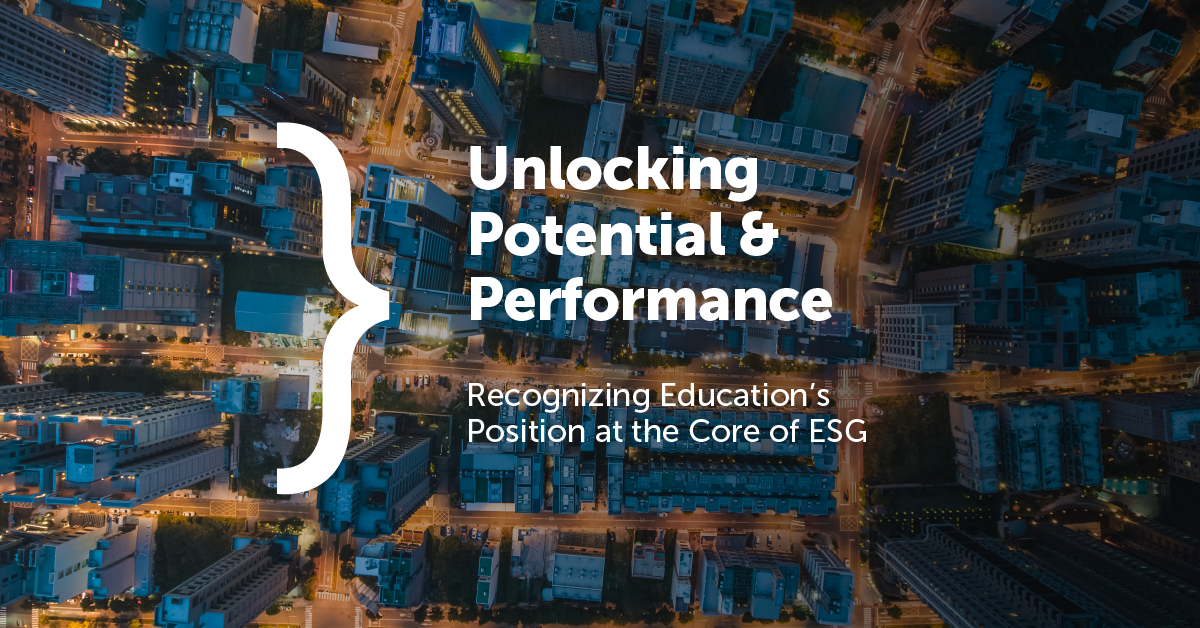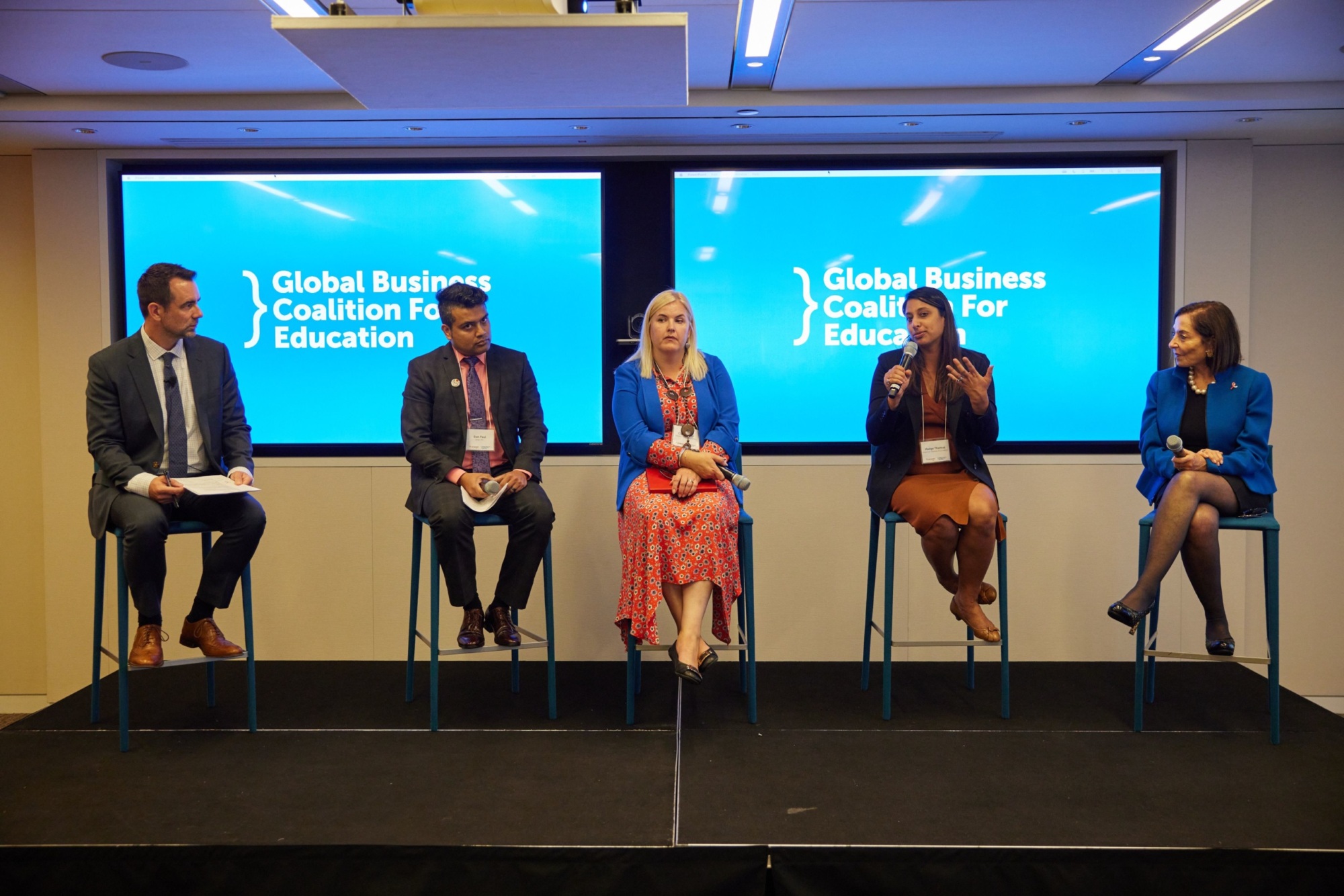
How can companies position education at the core of ESG?

News, Press Release
How can companies position education at the core of ESG?
New York September 23 2022: This week, the Global Business Coalition for Education launched a new report: “Unlocking Impact and Equity through Education: A New Approach to ESG” – to demonstrate how education is core to corporate environmental, social and governance (ESG) strategies.
The world is facing a learning crisis, with over 260 million children not going to school, and three out of four companies report difficulties finding talent. Investing in education and learning is not just a nice thing to do for businesses, but essential for their future. When it comes to social impact, companies traditionally committed to education find it challenging to integrate their efforts under environmental, social, and governance (ESG) frameworks. Similarly, ESG professionals do not, at first glance, view education as leverage point to advance their environmental or governance objectives.
But, as the report demonstrates, education is key to addressing many material issues that companies care about, including staff recruitment, child labor in the supply chain, diversity, equity and inclusion (DEI), resilience to climate change and brand reputation, among others.
To launch the report, Justin van Fleet, the Executive Director of the Global Business Coalition for Education led a panel discussion with Bish Paul, Global Head of DEI industry Collaboration at Snap Inc, Clara Govier, Managing Director at the People’s Postcode Lottery, Madge Thomas, President of the American Express Foundation and Head of Corporate Sustainability & ESG at American Express and, Sara Moss, Vice Chairman at Estée Lauder.
They shared insights on how their organizations integrate education into their ESG strategies and how they are able to make the case for investment in the next generation in corporate board rooms.
According to Sara Moss at Estée Lauder, investment in education is fundamental for the long-term success of the company.
Education does not stop when you come to a company.
Sara Moss, Vice Chairman, Estée Lauder
Estée Lauder is a global company working in over 150 countries with 60,000 employees around the globe. The company has invested in teaching skills and providing support to women, the advancement of whom is key to the sustainability strategy and success of Estée Lauder.
For Madge Thomas, education underpins American Express’ ESG work. The company has three established pillars: learning diversity, equity, inclusion; building financial confidence; and advancing climate solutions. Education is a fundamental building block of all three, and the company is investing in education for its employees, training colleagues on diversity and inclusion as well as climate.

A lot of our companies are the biggest beneficiary of an educated workforce. Right now, we are all facing a talent crunch.
Madge Thomas, President of the American Express Foundation and Head of Corporate Social Responsibility, American Express
In her role as President of the American Express Foundation & Head of Corporate Social Responsibility, Madge Thomas can build the bridge between CSR and ESG. She can translate ESG pillars and goals into priorities for the company’s community work.
The People’s Postcode Lottery operates across five countries (Germany, the Netherlands, Sweden, Switzerland, the United Kingdom). According to Clara Govier, when people play the lottery they also have the opportunity to ultimately give back to the community through a charity. The People’s Postcode Lottery is now the third largest private sector donor in the world. The lottery is a great way to engage a company’s consumer base in social good and support investment in education through donation to charities.

Education is an investment, not a cost. Companies cannot afford not to be investing in young people
Clara Govier, Managing Director, People’s Postcode Lottery
Finally, Bish Paul from Snap Inc discussed his company’s success to increase training and performance through its Diversity, Equity and Inclusion (DEI) efforts. In the last two years they have operationalized DEI and Education effort by setting up a number of indicators directly linked to education to report back on progress. At Snap Inc, education is not only a priority for philanthropy, it’s also a priority to recruit talent at university, or for technical recruiting programs. According to Bish Paul, Snap Inc is not just investing in education for its current workforce through apprenticeships and mentoring. Bish Paul acknowledges that one company can’t do it all, and making progress in education requires partnerships with other companies.

We practice collective action – a cross-industry collaboration to take on systemic issues such as education access.
Bish Paul, Global Head of DEI industry Collaboration, Snap Inc
This launch event helped start a conversation with social impact experts and ESG professionals on stage, in the room and on social media. In the future the Global Business Coalition for Education will continue engaging with business leaders and ESG experts, to truly position education at the core of ESG.

